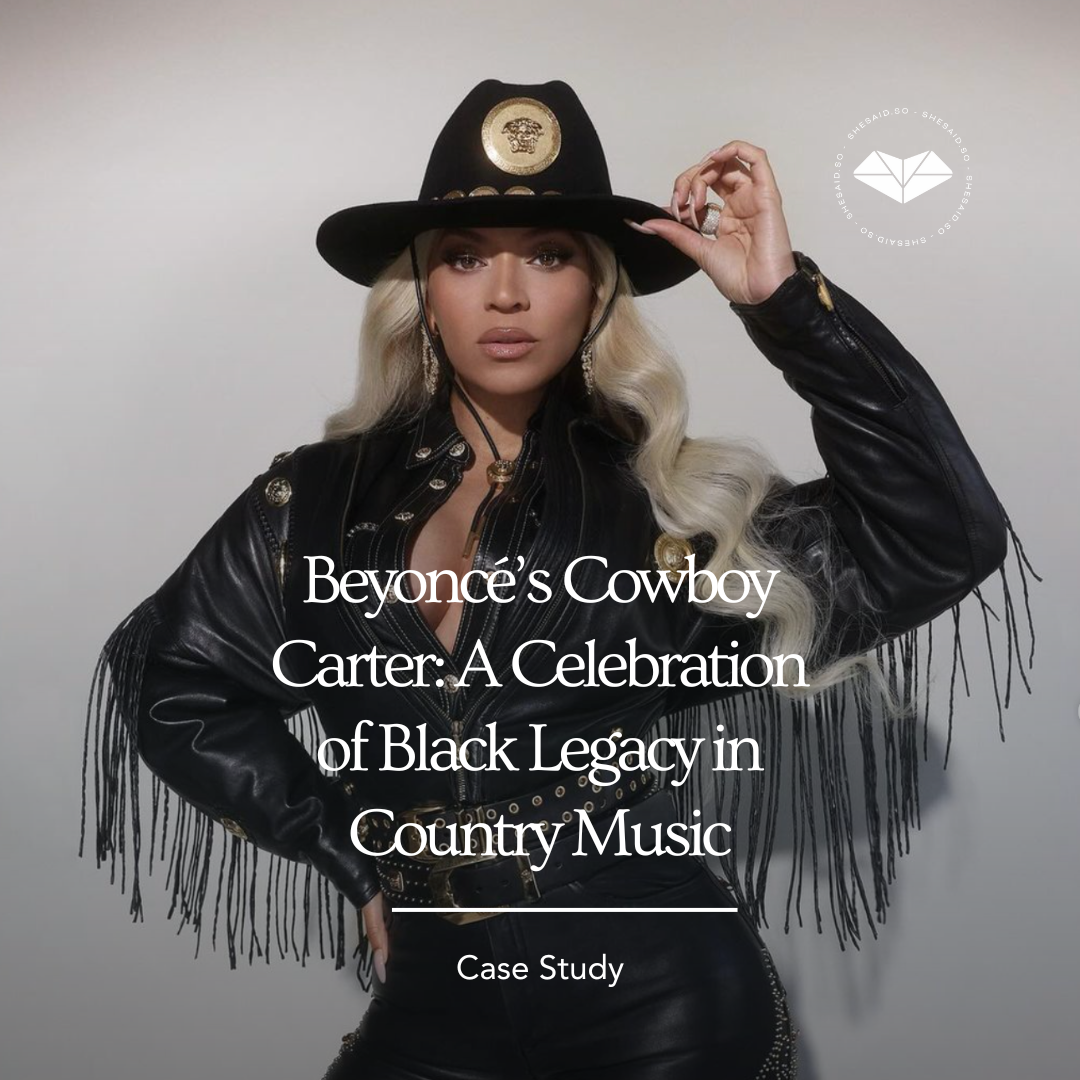Beyoncé's new album"Cowboy Carter" celebrates Black cultural influence within the country music genre. The album celebrates Black culture and music while addressing issues of erasure and discrimination while showcasing impressive collaborations (Dolly Parton, Willie Nelson, and more).
We're exploring the album's powerful message of identity and resilience, and delve into Beyoncé's strategic approach in the industry.
Beyoncé's latest album, "Cowboy Carter," breaks genre boundaries and celebrates Black culture and music while addressing issues of erasure and discrimination. The album has the most incredible list of collaborators and contributors Including Dolly Parton, Post Malone, Miley Cyrus, Rumi Carter, Willie Jones, Linda Martell, Willie Nelson, Shaboozey, Tanner Adell, Brittney Spencer, Tiera Kennedy, Reyna Roberts and Pharrell Williams.
The album's name, 'Cowboy Carter,' is inspired by the original Black cowboys of the American West, as stated by Beyoncé's Parkwood Entertainment. The character of Cowboy Carter symbolizes the 'Western fortitude' displayed by Black cowboys, aiming to reclaim the term 'cowboy' from its derogatory historical connotations. Additionally, 'Cowboy Carter' draws inspiration from Western films, with Beyoncé screening movies like 'Urban Cowboy,' 'The Hateful Eight,' and 'Space Cowboys' during the recording process.
"Cowboy Carter" has been in development since before Beyoncé's “Renaissance” album. Initially planned for release before Renaissance, it has been a long process with Beyoncé recording around 100 songs before finalizing the album. The delay in its release was attributed to the heaviness of the world during and after the COVID-19 pandemic, with Beyoncé wanting to bring joy to listeners when the time was right. She expressed gratitude for having the time and space to work on the album, ultimately trusting in divine timing for its release.
With a diverse range of sounds and collaborations with Black country artists, Beyoncé explores her family's ancestry and the Black roots of country music. Through spoken interludes and reinterpretations of classics like "Jolene," she highlights the challenges faced by Black musicians in the country genre. The album serves as a bold statement against critics who doubted her place in country music. It reflects Beyoncé's personal experiences, including her 2016 Country Music Awards performance, which faced racist backlash. It also references the historical mistreatment of Black Americans, symbolized by her reclaiming of her family's surname.
The album includes a tribute to Linda Martell, a pioneering Black country music singer. Martell's historic contributions to the genre, including her groundbreaking 1970 album "Color Me Country," paved the way for future Black artists in country music. Despite facing obstacles and setbacks in her career, Martell's legacy is being recognized and celebrated, with Beyoncé's homage marking another acknowledgment of her impact.
Beyoncé's rendition of Dolly Parton's classic song, Jolene, has sparked both praise and criticism. While some compare it unfavorably to the original, citing a perceived lack of vulnerability, others appreciate its departure from convention.
According to Dr Kadian Pow (Lecturer in Sociology and Black Studies, Birmingham City University), Parton's version embodies traditional white southern femininity, characterized by charm and demureness, contrasted with Jolene's fiery persona. “Beyoncé's interpretation, rooted in African American Women's Language, portrays a different narrative. She warns rather than pleads, asserting her multilayered Black identity and experiences. The song reflects a matured perspective on infidelity, with Beyoncé's husband standing by her side against the threat posed by Jolene. The differences in their approaches to the same theme highlight the intersectionality of age, race, and womanhood’.
As "Cowboy Carter" addresses themes of identity and resilience, it offers hope for a more inclusive future in the country music industry. While Beyoncé herself has clarified that her album isn't strictly country, its influence on the genre is undeniable. Beyoncé is paving the way for artists like Tanner Adell, Willie Jones, Tiera Kennedy, Linda Martell, Reyna Roberts, Brittney Spencer, and alt-country artist Shaboozey. Among those inspired by Beyoncé's impact are groups like The BoykinZ, a quartet of sisters from Atlanta suburbs, who see her creativity as a catalyst for their own artistic expression. Similarly, artists like RVSHVD, Ashlie Amber, The Kentucky Gentleman, and Chapel Hart are finding inspiration and encouragement in Beyoncé's approach to country music, ushering in a new era of diversity and inclusivity within the genre.
A new CNN FlashDoc titled "Call Me Country: Beyoncé and Nashville’s Renaissance" explores this topic further (to be released on April 26), examining how high-profile artists like Beyoncé and Lil Nas X are challenging the genre's status quo. The film features interviews with artists like Rhiannon Giddens and Brothers Osborne, as well as commentary from experts and co-directors of the Black Opry.
Beyoncé’s artistic endeavors are approached with strategic precision to amplify her impact and effectively convey her message in major events like at the Superbowl with the Beyoncé & Verizon Commercial or by channelling glam cowgirl style at the 2024 Grammy Awards. All the while, she considers the broader impact that her work has on those looking up to her and following in her footsteps.
Beyoncé's experience navigating exclusion in the music industry offers valuable insights. Following the backlash she faced after her performance at the 2016 Country Music Association (CMA) Awards, Beyoncé took a strategic approach in responding to exclusionary treatment. She chose not to directly address the incident at the time but instead focused on promoting her albums and expanding her representation in Black culture.
“This is not a country album,” she announced. “This is a Beyoncé album.” This suggests that her goal was not acceptance but to show that her work goes beyond the genre-limited thoughts. We should all find inspiration in her strategic approach: from letting the attacks go in the moment to finding collaborators keen to diversify the genre to developing her very own Queen Bey enterprise in Country Music.


